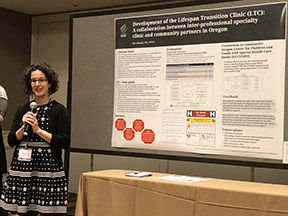OHSU UCEDD Prioritizes Youth Health Care Transition
February 24, 2020

|
Four out of five Oregon youth who experience disabilities report that they did not receive adequate transition services during their healthcare visits according to the National Survey of Children with Special Health Care Needs in 2016.
The Institute on Development & Disability (IDD) at Oregon Health & Science University (OHSU) Transition Committee has been working to address this issue since 2011. The committee is led by two University Center for Excellence in Developmental Disabilities (UCEDD) faculty, Kim Solondz, M.S., OTR/L, Director of the Occupational Therapy Program, and Maureen Delongis, M.S.W., LCSW, Director of Social Work, both at the Child Development & Rehabilitation Center in the Institute. Early efforts to improve health care transition focused on educating professionals to provide more robust transition services for families. However, in 2018, surveys with program directors indicated that while they recognized the importance of transition, they lacked the time and resources to provide in depth evaluation of transition readiness and transition plans for youth and their families. Annually, over 300 transition-age youth (12-21 years old) attend interdisciplinary clinics at IDD. These clinical visits focus on diagnosis or management of neurodevelopmental disabilities, not transition related issues.
To address the gap in services, in 2018, the UCEDD developed the Lifespan Transition Clinic (LTC) in partnership with the Oregon Center for Children and Youth with Special Health Care needs. The primary goal of this clinic is to help families 1) identify transition readiness; 2) prioritize transition goals; 3) identify mental health needs; and, 4) facilitate the steps to successfully transition to an adult system of care. Often this includes helping youth and families learn to use technology such as MyChart, learn to advocate for their needs, and make a plan to live well in the community.
To date, 21 families have participated in the LTC evaluation. The evaluation includes a mental health assessment and an occupational therapy assessment. During the clinic visit there is facilitated conversation among the youth, family members, and health care providers focused on transition readiness. Families and clinicians generate a plan for moving forward in the transition process. This clinical assessment model provides a unique structure that allows for youth and families to develop their own goals and highlight what is most important to them in the short and long term. Our community partners have then assisted youth and their families to embed assessment results into shared plans of care, school planning, or individual service plans.
To learn more about the Transition Clinic, visit https://www.ohsu.edu/sites/default/files/2019-03/Poster_Development%20of%20the%20Lifespan%20Transition%20Clinic_%20A%20collaboration_final.pdf or contact us at [email protected].







